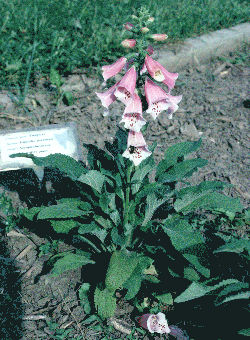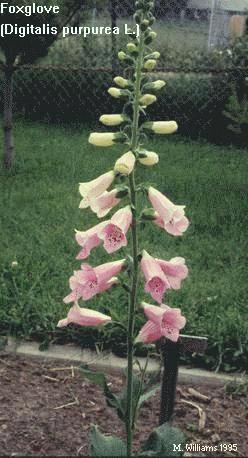Foxglove
Did you know that a chemical from this plant (digitalis) keeps 3 million people alive every day? But if you eat to much of this plant it will surely do you in.
Scientific Name: Digitalis purpurea
![]()
mature plant

![]()
![]()
Digitalis purpurea poisoning
General poisoning notes for Digitalis purpurea
Foxglove (Digitalis purpurea) is an attractive biennial plant that is cultivated in Canada and is naturalized in several provinces. Upon ingestion, this plant can cause toxic reactions that lead to severe sickness and death in animals and in humans. Several important pharmaceutical drugs such as digitalis and digoxin are derived from this plant. The chemicals increase the force of contraction of the heart muscle and are therefore used in cases of heart congestion. Foxglove (Digitalis purpurea) is a naturalized herb found in eastern Canada and British Columbia. It is also a common outdoor ornamental. All classes of livestock are susceptible to poisoning by foxglove. However, because of the unpalatable nature of the plant, poisoning is infrequent, although when it does occur it is often severe and dramatic, frequently resulting in death. Human poisoning occurs rarely. However, poisoning was reported in the children who ate the flowers or drank water from vases. Accidentally including foxglove leaves in tea has led to poisoning and death. Cardiac glycosides are commonly described drugs that have a low margin of safety. Slight overdoses of prescribed medicine can cause symptoms of toxicity (Cooper and Johnson 1984, Cheeke and Schull 1985, Joubert 1989).
Nomenclature
Botanical name: Digitalis purpurea L.
English Common name: foxglove
French Common name: digitale pourpre
Botanical family name: Scrophulariaceae
English family name: figwort
French family name: scrophulaire
Toxic parts = all parts, flowers, leaves, seeds, stems
Notes on toxic chemicals
Digitoxin is one of several cardiac glycosides found in foxglove and is considered the most toxic of these chemicals. The toxins are split by hydrolysis into a sugar and an alglycone (nonsugar compound). The aglycones have a direct effect on the muscles to the heart (Joubert 1989).
Toxic chemicals = digitoxin

 Wildflower
Seed For Sale
Wildflower
Seed For Sale